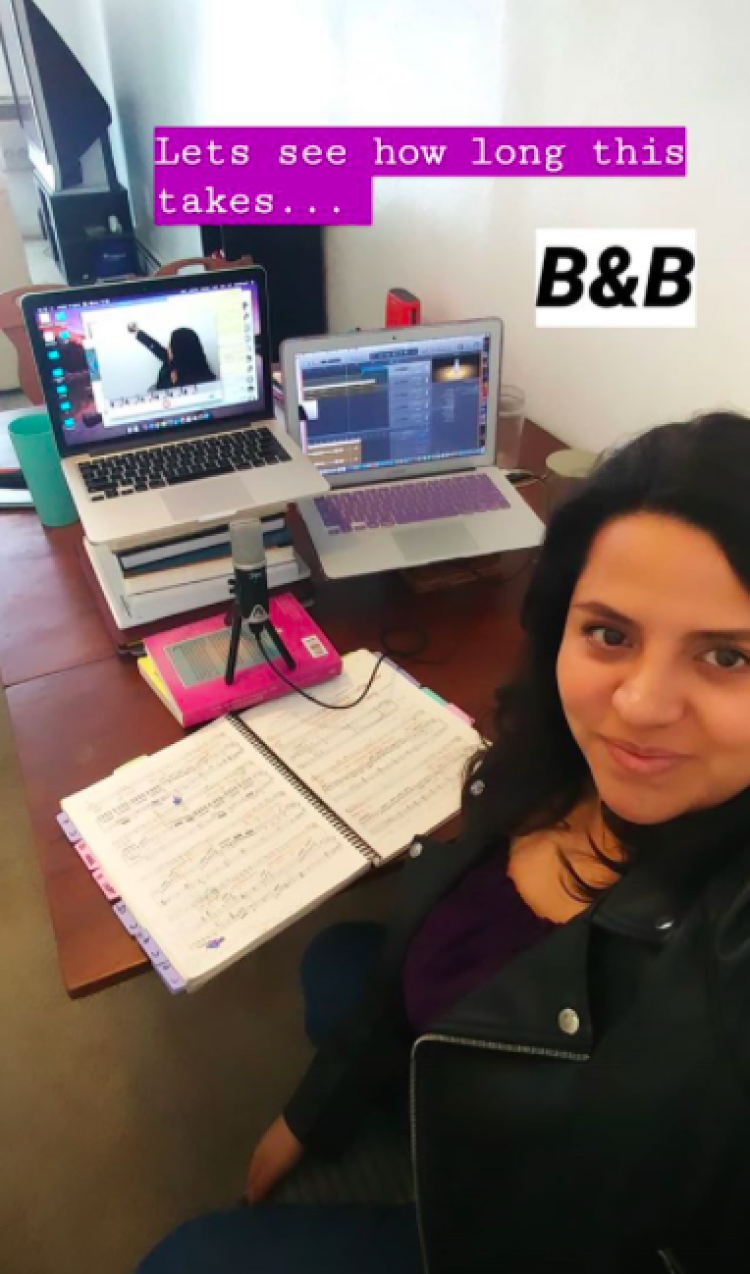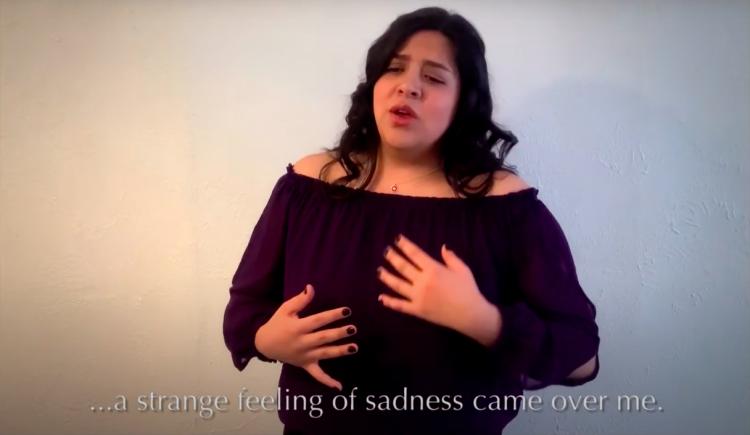The show must go on(line)
Banner image: Patrick Bessenbacher and Berenice Carrera duet virtually during Béatrice et Bénédict: A Quarantine Opera
Rehearsals for the CU Boulder Eklund Opera’s Béatrice et Bénédict had been underway since the fall semester and into March. Preparations were in full swing for the April performance. CU Boulder College of Music students had memorized their music and stage positions, and had been fitted for their costumes.
Four weeks before the production was scheduled to premiere, the opera was canceled because of the COVID-19 stay-at-home order.
Performers are meant to be in front of an audience, to draw upon the energy of laughter and applause. Having the performance put on hold for the foreseeable future was agonizing for the students.
Thanks to inspired brainstorming from music faculty, they decided that the show would go on, but not as a live production. Eklund Opera is presenting video versions of Béatrice et Bénédict: A Quarantine Opera on the CU Presents channel.
Nicholas Carthy, music director with the Eklund Opera Program and associate professor of opera, immersed himself in learning how to create a virtual performance that would allow students with a goal to learn and to perform in a new format.
“I thought, yes, this is possible. We can do this,” Carthy said. “If a stage is a box, then a video screen is also a box. What’s important is how you fill the box. It really is a great way to keep the singers active and engaged for the rest of the summer.”

Berenice Carrera behind the scenes recording for Béatrice et Bénédict

Berenice Carrera sings Beatrice's aria “Il m'en souvient.” The translated subtitles read: “...a strange feeling of sadness came over me.”
Béatrice et Bénédict, written by Hector Berlioz, is based on Shakespeare’s Much Ado About Nothing.
“I told them everything to prepare for in terms of what to wear,” said Leigh Holman, director of Eklund Opera. “Where the camera should be—facing your eyebrows—and the lighting has to be in your face. They just figured it out from there in their own homes.”
Character interactions had to be carefully timed in order to work on video.
“The slap and the apple toss were cued and practiced on a musical cue so they knew when that was going to come musically,” Holman said. “It’s like when film stars have to work with an animation of Micky Mouse. They have to imagine where they need to be.”
Students share their experiences
Two of the student performers shared their experiences performing from their homes. Berenice Carrera graduated this spring with a bachelor’s degree in music in vocal performance. She will start graduate school in the fall at Louisiana State University working on a master’s in vocal performance. Christine Li just finished her first year of a master’s degree in vocal performance and vocal pedagogy.
What did you have to do differently for the video?
Carrera: Each time I recorded a video was different because I had to focus on different things. When I recorded the first duet, I was worried about the shadows not matching the other person. The audio and video were also different each time. The first time I used my computer, but I didn’t like the quality of the video so I asked to borrow my roommate’s phone which had a great camera. She loaned me her mic too. The audio of my phone was not good enough so I had to record the audio on my computer while recording the video on a borrowed phone. But it was fun and it got easier as we worked on it.
Li: I had to be way more organized and specific in this setting because I didn’t have my partner with me, which made the timing for acting movements matter so much more. I recorded everything on my phone by rigging it with double-sided tape, stuck onto a music stand with books stacked underneath to get the right angles. For the lighting, I took off my lampshades and set my lamps on giant stacks of books so I could have enough lighting.
What was a particular challenge for you?
Li: There were moments when I didn’t think I could do this. I recorded an aria three times one night because I just didn’t like how I sounded, or I wasn't lining up right with the orchestra track. In a way, it felt like growing pains because we had to learn how to take on a lot more responsibility than we usually do in a live production with a conductor. It was definitely a challenge, but I feel like it can only be better from here on out.
Carrera: It was stressful having to think about all the aspects of a performance by myself, the lighting, hair, makeup and wardrobe while acting and making sure I’m in the frame. Seeing that we actually made it work and it’s fun to watch and it sounds great makes me really happy.
What did you learn from this experience?
Li: There were so many times I was uplifted because we were still able to make music. Because of that, I have so much hope for the fall. We took extraordinary measures and still created something on short notice. If we were able to make something out of this in less than a month, I have high hopes and a strong belief in the faculty that they’ll do everything they can so that we’ll all still have a good experience this upcoming year.
Carrera: I was like, OK, I’m just going to take this in the best way possible and try to make it better. I learned a lot about myself. It was so helpful that we weren’t alone during this process because Dr. Holman and Maestro Carthy were there all the time to help us, as well as our coaches (Jeremy Reger, assistant professor of vocal coaching, voice and opera, and Mutsumi Moteki, professor of vocal coaching). They made it much easier.
Using a video platform to make music magic
Recent music graduate David Starry played an important and integral role as sound engineer for the project. He graduated in the spring with a master’s degree in voice. His audio engineering and editing seamlessly brought together the musical performances
In order to make the video appear as if the students were performing in the same room, they relied on the experienced tech support and guidance from Brad Stabio, owner of Stabio Productions in Denver, who has worked with College of Music opera for 11 years.
“There’s always magic that happens, even unintended, it’s editing magic,” Stabio said. “Their voices are so great and that carries everything and helps make that magic happen. Everyone far exceeded what I expected from people with their experience to be doing things that people in my industry take years to learn.”
To view Eklund Opera’s videos of Béatrice et Bénédict: A Quarantine Opera, go to the CU Presents channel.


